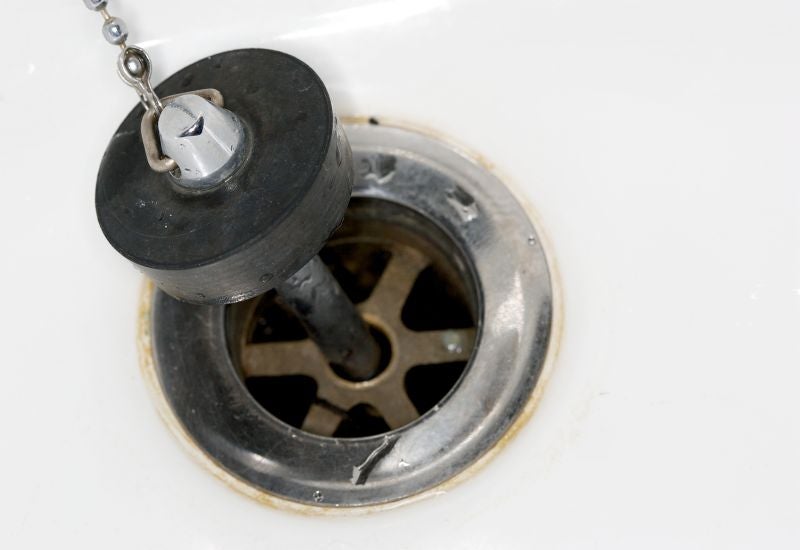10 Things You Should Never Put Down Your Drain
Ten Things You Should Never Put Down Your Drain
Every family has daily routines and habits. You make your morning coffee, cook pasta for dinner once a week, and perhaps enjoy a fried breakfast on the weekend. But have you ever considered how these seemingly harmless habits can disrupt your home’s plumbing system? If you’re not cautious about what you put down the drain, you could end up with some serious clogs. Protect your plumbing system by understanding what should never go down your drain.

How to Know If Your Drain is Clogged
Spotting a clogged sink or shower drain is straightforward. The first sign is water draining more slowly than usual. If you don’t address this issue promptly, the water may stop draining altogether, signaling a complete blockage. Slow drains typically don’t arise overnight. They develop after weeks or months of foreign objects going down the drain, so there’s usually plenty of time to act before the clog becomes severe.
Things to Not Dispose Down Your Drain
It’s a common misconception that if your sink has a garbage disposal, all foods are fair game. But this is simply not the case. Certain items can harm your plumbing system whether you have a garbage disposal or not. Here’s what you should never dispose of down the kitchen or bathroom sink:
- Used cooking grease: This is perhaps the most notorious drain-clogging substance. Grease is liquid when hot, but as it cools, it solidifies and sticks to the inside of your pipes. This sticky residue then attracts other items, like eggshell bits or food particles, creating thick, goopy blockages. Even if the grease manages to remain a liquid until it reaches the city sewer line, it causes problems there, resulting in millions of dollars and countless hours of repair work.
- Coffee grounds: Many people mistakenly believe that coffee grounds won’t pose a problem if rinsed down the sink. After all, the particles are tiny and harmless, right? Think again. Coffee grounds are a leading cause of clogged kitchen drains because they can easily accumulate and cause blockages.
- Pasta: Cooked noodles might seem like a soft, easy-to-break-down food, but the starchy consistency is problematic for drains. Pasta containing semolina continues expanding and softening once it’s down the sink, resulting in a sticky substance that can form blockages. While organic pasta without semolina might be less problematic, it’s always better to avoid the risk.
- Rice: Rinsing large amounts of rice down the drain might seem like no big deal, but like pasta, rice expands when it absorbs water. Over time, these grains can grow and clump together, leading to potential blockages that may be difficult to dislodge.
- Eggshells: Have you heard that eggshells sharpen garbage disposal blades, meaning you should intentionally put them down the drain? Don’t fall for this rumor! Eggshells present a unique problem because, once ground up, they turn into smaller bits, which combine with grease and other residue to form a sandy paste. This paste can easily stick to the sides of pipes, creating obstructions over time.
- Flour: A staple in most kitchens for baking cookies and thickening gravy, flour can be deceivingly harmful when mixed with water. After all, flour is a thickening agent. When it combines with water in the pipes, it coats the insides, slowly building up and catching other waste items until severe blockages occur.
- Fruit pits: A garbage disposal might seem powerful, but it’s not robust enough to effectively pulverize fruit pits. Not only can this jam the disposal or damage the blades, but large pit fragments can become lodged in the drain.
- Bones: Small chicken bone fragments are easy to miss when rinsing your plate, but do your best to scrape them into the trash instead. Standard garbage disposals aren’t equipped to break these down, so over time, bits and pieces can accumulate in the drain and cause blockages.
- Medication: Disposing of unused or expired medicine down the drain might not directly clog your pipes, but they can enter the water supply and cause broader environmental and health implications. Recent studies from the US Geological Survey have found traces of pharmaceuticals in the drinking water supply, underscoring the importance of proper disposal.
- Household fluids: Similar to medication, household fluids like paint thinner, bleach, coolant, and motor oil don’t necessarily cause clogs, but they pose a different kind of threat. Many regions have strict regulations on household fluid disposal to prevent water contamination. Follow these guidelines to avoid contributing to environmental and health concerns.
Contact Eagerton Plumbing
With 70 years of experience, Eagerton Plumbing is a trustworthy place to turn for drain cleaning services in Jacksonville, Orange Park, and nearby areas. As a Florida State Certified company, we prioritize affordable and tailored solutions that align with your needs. Our commitment is further showcased through our 24/7 emergency plumbing services. Don’t let a clogged drain disrupt your peace of mind. Contact us at (904) 388-0761 to schedule the plumbing services you need.
RECENT POSTS
categories
- Uncategorized
- Water Heater Installation
- Tankless Water Heater
- Plumbing Services
- Bathroom Remodeling
- Hot Water Heater
- Plumber in Jacksonville
- Water Heater Repair
- Eagerton Plumbing
- Eco-Friendly Plumbing Repair
- Water Damage
- Plumbing Leak
- Sewer Line Repair
- Infographic
- Clogged Drains
- Kitchen and Bathroom Remodel
- Bathroom Plumbing
- Residential Plumbing Services
- Garbage Disposal
- Toilet Repair
- Water Heater Replacement
- Water Conservation
- Emergency Plumbing
- Commercial Plumbing Services
- Kitchen Design Inspiration
- Kitchen Remodel
- low-flow toilets
- Leaky Faucet
- Conserve Water
- Drain Pipes
- Kitchen Sinks
- Vessel Sink
- Plumbing Problems
- Water Leak
- Commercial Remodeling Contractors
- Drain Cleaning Services
